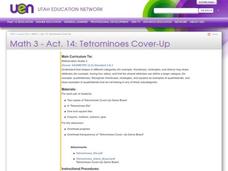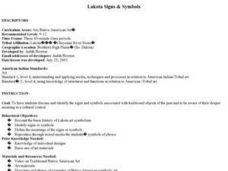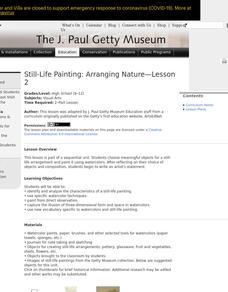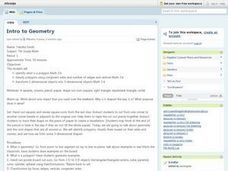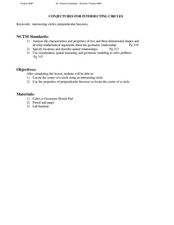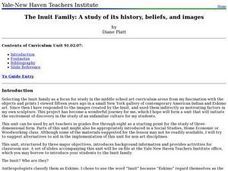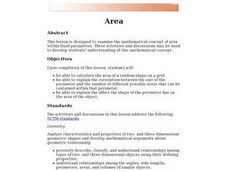Curated OER
Mapping Deep-Sea Habitat
Students create a two-dimensional topographic map and a 3-D model of landforms. In this creative lesson students create 2 and 3-D objects and learn how to interpret the data from these things.
Curated OER
Tetrominoes Cover-Up
Third graders compare and contrast the attributes of two-dimensional shapes. Using a tetrominoes game, they create two-dimensional shapes to cover up a game board. At the conclusion of the game, 3rd graders discuss the patterns they...
Curated OER
Principles of Flight: Flying Paper Airplanes
Students investigate ways to enhance an object's flying ability. In this model construction instructional activity, students construct two paper airplanes, one of which is twice as big as the first. Students compare and...
Curated OER
Platonic Solids
Students identify different types of polygons. In this geometry lesson, students differentiate between convex and regular shapes. they identify the names of two and three-dimensional objects.
Curated OER
Lakota Signs & Symbols
Students discuss and identify the signs, symbol, and sacred animals associated with traditional Lakota objects of the past. They then design and create a two-dimensional piece of art that incorporates one of these signs or symbols.
Curated OER
Still-Life Painting: Arranging Nature—Lesson 2
Learners choose meaningful objects for a still-life arrangement and paint it using watercolors. After reflecting on their choice of objects and composition, students begin to write an artist's statement.
Curated OER
Build an Approximate Scale Model of an Object
Students create a model of an object of their choice using sketches that they have drawn. They study what a scale model is and how to construct one. They examine the uses for scale models and why they are produced.
Curated OER
WS 1.9 Review-Calculations
In this calculations review worksheet, students convert from one metric unit to another, they identify significant figures in numbers, they find density of substances, and they solve problems using dimensional analysis.
Curated OER
What's My Rule for Sorting?
Students view objects sorted by one characteristic and name that characteristic. In this sorting rule lesson, students explore to find a new characteristic and write a description of that rule. In early grades the rule might...
Curated OER
Intro to Geometry
Seventh graders identify a polygon and classify them using congruent sides and number of edges and vertices. Students transform two dimensional objects into three dimensional objects.
Curated OER
An Introduction to Measuring Theory
Students investigate one, two and three dimensional objects. In this algebra instructional activity, students differentiate between different shapes of objects and write equations to represent each. They start with what they already know...
Curated OER
Identify Cones
Third graders evaluate the attributes of cones. In this space shapes lesson plan, 3rd graders analyze three-dimensional shapes. Students explore the faces and edges of a cone.
Curated OER
Make a Box
Young scholars use specific dimensions to create a box. In this geometry lesson plan, students analyze the different properties of two and three dimensional shapes. They make conjectures and use it to solve problems.
Curated OER
A Sphere and Its Net
Students identify and sketch the nets for sphere. In this geometry instructional activity, students differentiate between two and three dimensional shapes. They find the surface area of each sphere.
Curated OER
The Louis Vuitton Project, using 3rd degree equations
Students model three-dimensional objects using cubes. In this geometry activity, students calculate the volume and derived the amount mathematically. They use different objects to create two and three-dimensional objects.
Curated OER
Conjectures of Intersecting Circles
Young scholars make conjectures of intersecting circles. In this geometry lesson, students observe circles and their position in space. They investigate and observe two and three dimensional objects.
Curated OER
Pop Art-Reflections of the Mass Media
Students select a common object or a face, and draw or paint it on a flat surface making it larger than real life. They choose a common object or simple scene and repeat it horizontally or vertically as defined rows. They create a flat,...
Mathematics Assessment Project
Calculating Volumes of Compound Objects
After determining the volume of various drinking glasses , class members evaluate sample responses to the same task to identify errors in reasoning.
McGraw Hill
Metric Units of Weight and Volume
Getting the right measurements can save a lot of time and money in the real world. Learners are introduced to unit conversion and how to accurately go from one unit to another. The first pages are notes and then the packet finishes with...
Curated OER
The Inuit Family: A study of its history, beliefs, and images
Students study the Inuit in terms of their geographic location and its influence on their way of life. They investigate Inuit imagery as a reflection of their belief system and focus on the objects of the Inuit to introduce...
Curated OER
3-D Figures Part 1
Elementary schoolers explore 3-D shapes. They transition from thinking of shapes as only 2-D. Pupils read Cinderella as a launching activity for their upcoming adventure, and explore a new world of 3-D shapes in this introductory lesson.
Curated OER
Area Applet
Elementary math classes calculate the area of a shape and explain the correlation between the size of the perimeter and the areas that can be contained within that perimeter. They also explain the effect the shape of the perimeter has on...
Curated OER
Identify Shapes and Matching Parts
Learners identify real world objects as shapes they have learned. In this 3-D shapes worksheet, students identify shapes such as a cube for a box, a sphere for a globe, and a cylinder for a soup can.
Curated OER
Altimetry
Fifth graders accurately measure the distance to eight points on an uneven surface by conducting a simulation of sattelite altimetry. They create a two-dimensional model of the simulated ocean surface by graphing data from the Radar Run...

